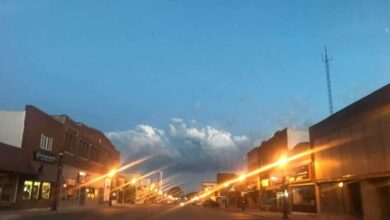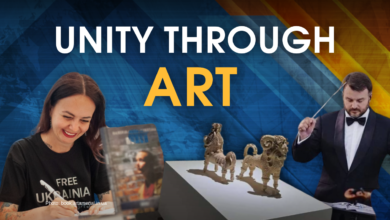A couple of hundred people gather under a large canopy in the sweltering June heat. They listen rapt as a young Israeli couple treat them to a virtuoso tour of the musical world in what they dub a “Kabbalat Shabbat concert.”
The weekend series of concerts in a variety of venues around Krakow’s Kazimierz district is the culmination of the week that is the Jewish Culture Festival in Krakow. The audience is a strange mix of tourists, Poles, people who’ve flown in from around the Jewish world for the concerts, and even people wearing their Shabbat best.
Maya Belsitzman and Matan Ephrat have come to Krakow with their two small children in tow and Savta, who takes equal pride in her daughter’s musical ability and her slumbering grandchildren. Belsitzman plays cello and sings. Ephrat is an accomplished percussionist. The rapturous applause spreads to onlookers outside the tent at the end of each piece. The audience is clearly engaged.
It’s the 33rd iteration of the festival founded and directed by Janusz Makuch, his staff, and a dedicated team of volunteers known as the machers.
Their headquarters is located in the back office of a former beit midrash, now a Bohemian café called Cheder. The eatery offers a mix of Jewish and Israeli dishes with perhaps a surprising focus on the Middle East rather than traditional Polish fare. Finjan coffee pots adorn the space along with hanukkiot and Jewish books. Many diners opt to sit on cushions on the floor of an area that is sometimes used as a stage, while others sit in window seats studying or reading novels.
“The theme this year is Shema Yisrael,” he says in perfect Hebrew. His Yiddishisms and quotes from rabbis make it hard to believe he isn’t a fully paid-up member of the tribe.
Some of the festival goers are real groupies. They’ve been coming to Krakow for years just to get a taste of this form of Jewishness.
Saturday evening. The audience fills a hangar in the nearby industry museum. Eight performers take to the stage with a variety of Middle Eastern instruments. They play pieces in styles from Morocco to Persia. This is Maqamat – straight from Safed in northern Israel. Polish grandmothers rub shoulders with Jewish-American twentysomethings swaying and clapping along to the band’s hypnotic rhythms. It’s a big production and a swinging success.
Just down the road lies the Galicia Jewish Museum. It’s a remarkable collection of historical photographs of Jewish life in this region. Managed by a dedicated, highly knowledgeable non-Jewish team, the collection “challenges the stereotypes and misconceptions typically associated with the Jewish past in Poland and educates both Poles and Jews about their own histories, whilst encouraging them to think about the future.”
The museum uses the festival as a great backdrop to launch a new temporary exhibit: To Leave Something to the World. Beyond the Pages of Renia Spiegel’s Diary. Spiegel wrote her diary in Przemysl (close to today’s border with Ukraine) from January 1939 to July 1942. The museum says the diary “is undoubtedly a valuable historical source, an important work of literature, a piece of personal document literature of Polish Jews, and a unique record of the last years of the life of this young, talented, ambitious woman, murdered by German Nazis in July 1942.”
Some sorrow in joy
BUT THE culture festival is a celebration of life, in the shadow of the events in Israel – Belsitzman wears a yellow pin as she performs. American wife and husband duo Deborah Strauss and Cantor Jeff Warschauer speak to the audience in a mix of English and Yiddish, accompanied by a Polish interpreter. They’re big into klezmer and wordless niggunim, with easy-to-remember “la-las” or “bim-boms.”
Throughout the week-long festival they’ve been teaching this art to festival-goers – mainly young Poles with a penchant for instrumental music. The whole ensemble comes together for a full-on concert, sharing what they have learned with the packed audience. Strauss encourages the crowd to join a heimishe conga line, which twists and turns its way through the tent, encouraged by those who remained seated.
Californian Maurice Olsberg, who now resides in Manchester, England, has been coming to the festival for years. He loves the performers and their music but perhaps more so he enjoys rubbing shoulders with others who revel in cultural Jewishness.
“I never thought I’d come to Poland but then a friend invited me. She was DJ-ing a few years back and said I’d love it,” he says on the sidelines of yet another evening concert. “There’s so much to do at the festival. There are lots of non-Jews, which I find really important. I’ve met people from all over Europe who like music and are into Jewish culture.”
In addition to concerts, there are guided walks, thought-provoking lectures and just a sense of bonhomie in the streets of Kazimierz.
Of course, the festival has its critics. Anything Jew-ish in Poland is targeted by Israeli and/or Jewish skeptics but the organizers prefer to respond through their actions rather than words. The machers, this year for instance, include a volunteer originally from Lebanon and a woman in a hijab from Azerbaijan who both want to learn about Judaism while having a thoroughly good time.
On the site of such horror just decades ago, the conga line brings together swarthy Middle Eastern Jews, youthful Ashkenazi Americans, and, yes, blonde-haired, blue-eyed Poles – young and old, dancing hand in hand, celebrating what once was, with the shared hope that Jewish traditions will be protected for years to come.
Mark and David host The Jerusalem Post Podcast – Travel Edition. They were the guests of the Polish Tourism Organisation, Małopolska Tourism Organisation, and the Municipality of Krakow.



